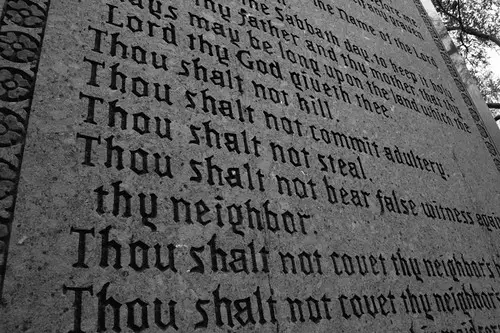A new bill making its way through the Georgia legislature could soon require all public elementary and secondary schools to display the Ten Commandments in multiple locations on campus.
📝 What’s Happening: House Bill 313, introduced by six Republican lawmakers, calls for the mandatory display of the Ten Commandments in Georgia’s public schools. The bill states that posters or framed copies must be placed in at least three locations in each school: the main entrance, the library, and the cafeteria.
🔑 Key Terms:
Legislation: Laws or rules made by lawmakers.
Legislator: An elected official who represents you in the legislature. These are lawmakers who make laws.
Legislature: The state’s version of the house and senate. Georgia has a state house and a state senate that passes laws that apply to the state.
Georgia General Assembly: The full name of the Georgia legislature.
👨🎓 Who Made it Happen: The bill is sponsored by Representative Emory Dunahoo of the 31st District, along with Representatives Charlice Byrd, Noelle Kahaian, Steve Tarvin, Mike Cameron, and Martin Momtahan. It has been assigned to the House Education Committee for further discussion.
🔍 Why It Matters: Supporters argue that the Ten Commandments are historically significant and serve as a foundation for the nation’s legal system. The bill references Supreme Court rulings that have allowed religious displays in government settings, citing them as justification for requiring these postings in schools.
🚫 Opposition and Legal Questions: Opponents, including civil rights and secular advocacy groups, are expected to challenge the bill on constitutional grounds. The Supreme Court has ruled in the past that mandatory religious displays in public schools may violate the Establishment Clause of the First Amendment. Legal experts anticipate that if the bill passes, it could face immediate lawsuits.
📈 What’s Next: HB 313 is currently in its first stage, having just been introduced to the House. It must pass committee hearings before heading to a full vote in the legislature. If it clears those hurdles, it will require approval from the governor to become law.
🤔 Why This Should Catch Your Attention: If passed, the law could set a precedent for religious displays in public schools and may influence similar legislative efforts in other states. It also raises questions about the separation of church and state and how public education balances historical context with religious expression.
💡 Take Action: Residents can contact their state representatives to voice their opinions on HB 313. The House Education Committee will be holding hearings where public input may be considered.
⚖️ What the Constitution Says: The First Amendment of the U.S. Constitution includes the Establishment Clause, which prohibits the government from establishing or favoring a religion. This clause has been the foundation of numerous Supreme Court rulings that limit religious expression in public schools.
In cases such as Stone v. Graham (1980), the Court ruled that requiring the Ten Commandments to be displayed in classrooms was unconstitutional. Justices have consistently found that such mandates violate the separation of church and state, reinforcing that public institutions must remain neutral in matters of religion.
📜 The First Amendment: “Congress shall make no law respecting an establishment of religion, or prohibiting the free exercise thereof; or abridging the freedom of speech, or of the press; or the right of the people peaceably to assemble, and to petition the Government for a redress of grievances.”
What Does it Mean: The First Amendment protects five big freedoms that everyone in the United States has.
These are the five freedoms:
- Freedom of Religion — You can believe in any religion you want, or not believe in any religion at all. The government can’t force you to believe something or punish you for your beliefs.
- Freedom of Speech — You can say what you think and share your ideas, even if others don’t agree with you without the threat of retribution from the government.
- Freedom of the Press — Newspapers, TV, websites, and reporters can share news and opinions without the government telling them what to say.
- Freedom to Assemble — You can gather in groups to protest, march, or meet peacefully to talk about things you care about.
- Freedom to Petition the Government — You can ask the government and government representatives to fix problems or make changes by writing letters, starting petitions, or speaking out in public.
In short, the First Amendment makes sure you can have your own thoughts, share your ideas, and stand up for what you believe — as long as you do it peacefully.
🇺🇸 About Representing You: This is an ongoing series of news stories devoted to how the officials elected and appointed to represent you are voting, how they are spending their time and your tax dollars, and allowing you to better determine if you feel they are actually representing you or their own interests.

B.T. Clark
B.T. Clark is an award-winning journalist and the Publisher of The Georgia Sun. He has 25 years of experience in journalism and served as Managing Editor of Neighbor Newspapers in metro Atlanta for 15 years and Digital Director at Times-Journal Inc. for 8 years. His work has appeared in several newspapers throughout the state including Neighbor Newspapers, The Cherokee Tribune and The Marietta Daily Journal. He is a Georgia native and a fifth-generation Georgian.


